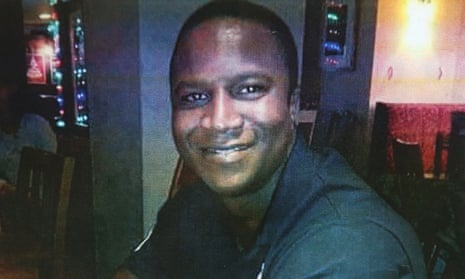The family of Sheku Bayoh were prevented from saying their final goodbyes because a miscommunication by the police watchdog meant a postmortem examination was carried out before his relatives were ready to identify his body, according to his sister.
In a morning of moving testimony at the inquiry into Bayoh’s death in custody, his sister Kadi Johnson set out a catalogue of alleged errors, miscommunications, conflicting information and apparent absence of compassion as she described her family’s treatment by the police and authorities from the moment they were informed the 31-year-old had died.
Giving evidence before Lord Bracadale at the independent inquiry in Edinburgh, Johnson described how the family had put their trust in Police Scotland, the Police Investigations and Review Commissioner for Scotland (PIRC), and the Crown office, but “time and time again … lost faith” as they failed, she believes, to offer a truthful account of how and why Bayoh died.
Bayoh, a father of two, died in handcuffs and sustained multiple injuries after officers responded to calls from the public about a man brandishing a knife and behaving erratically early on a Sunday morning in Kirkcaldy, Fife, in May 2015.
Bayoh’s family believe his death was caused by positional asphyxia because of the tactics used by the police, whom they allege overreacted and were motivated by racial bias.

Johnson said she had asked to delay the family’s identification of her brother’s body for a day to allow their mother to travel from London. But when the family’s solicitor called to arrange the viewing he was told by the PIRC that a postmortem had already been conducted, and relatives were able to view the body only from behind glass, with only the face visible.
“We just wanted to see him, touch him for the last time, have that last connection with him,” said Johnson. “It would have given us some peace.”
She concluded with the bleak assessment: “If Sheku was white, he would have been treated in a different way. I’m saying this now with a lot of fear because I know I will get people coming for me … but that is how I feel.” Johnson earlier spoke of receiving ongoing death threats and of concern for her children’s welfare.
“If Sheku was white, the police would have approached him in a different way, they would have approached us as a family in a different way.” His colour meant that the police treated him differently “from the very first instant they met him”.
During more than three hours of testimony, Johnson also revealed how the family were initially offered conflicting explanations for how Bayoh had died. The first officers to visit her home told her that her brother had been found lying on the road and died in an ambulance on the way to hospital, while police were “looking for two guys”.
Ten minutes later, the officers returned and, reading from a police notebook, told the family that Boyah was involved in a “forceful arrest” and during that lost consciousness and died.
Later that afternoon, Ch Supt Garry McEwan, who has now retired, arrived at the house and told them Bayoh had been carrying a machete and had punched and stamped on a female police officer. After the family reacted in shock to this news, because it was “not in his character”, Johnson said, McEwan amended this to “a blade or a knife”.
Her conclusion was that the police would not have treated a white family this way: “Why do they think they can come to a black family and just tell us anything without us asking questions and wanting to know the truth?”
Johnson said it was “very painful” to read inaccurate media reports that suggested “he was responsible for his own death and that he deserved to die”.
She added: “We just kept going because we knew who Sheku was and what he was capable of doing.”
The inquiry continues.









